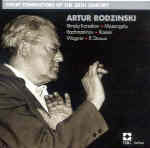Compared to many of his contemporaries, much of Artur Rodzinski’s long, fruitful career is relatively undocumented on CD, so this is a welcome release. In his day Rodzinski was a major podium presence; he worked with Stokowski and the Philadelphia Orchestra in the late 1920s, led the Los Angeles Philharmonic in the early 1930s, and the Cleveland Orchestra from 1933-1943. Toscanini chose him to train the then-new NBC Symphony, and in the 1940s he directed the New York Philharmonic and then the Chicago Symphony. In the 1950s he guest conducted widely and his recordings, some of which are now cult items, most often were made for Westminster and EMI. This set largely focuses on that final period, in which a conductor known for his energetic, often volatile performances had mellowed–and on the evidence here, he was as effective in lyrical music as in flashier repertoire.
Rodzinski’s reputation for volatility, though, is confirmed by the 1950 William Tell Overture, where following the drop-dead gorgeous warm bath of the cello solo, the Lone Ranger enters with a piercing trumpet that leads to an orchestral ride as thrilling as any on disc. We hear that same Rodzinski again in the Rachmaninov Second with the New York Philharmonic in 1945, where the conductor’s flowing tempos make Previn seem slow and Temirkanov inert. There’s an explosiveness to Rodzinski’s interpretation that keeps you on the edge of your seat, though some listeners may be troubled by its lack of the conventional “Slavic brooding” we usually hear in this work. The Philharmonic’s strength and precision are at one with the conductor’s, and elsewhere on this set Rodzinski has other orchestras playing at a higher level than usually heard from them in the 1950s.
Beecham’s Royal Philharmonic, for example, contributes an exciting, colorful Russian Easter and an atmospheric Khovanshchina Prelude, both from 1958; and from 1955, we get beautifully conceived and executed excerpts from Die Walküre and Götterdämmerung. There’s more Wagner, namely a Tristan und Isolde memento of Rodzinski’s brief tenure with the Chicago Symphony. The Strauss works date from 1957 and 1958, by which time the ill and frail maestro had been warned by a doctor that “continued conducting would be suicide.” It would be easy to imagine some sort of valedictory effort on his part, but what we hear are strong, warm performances with dampened intensity, the drama slightly subordinated to the lyrical. The sound is uniformly good, with detailed stereo and fine transfers of the older monophonic items.
































